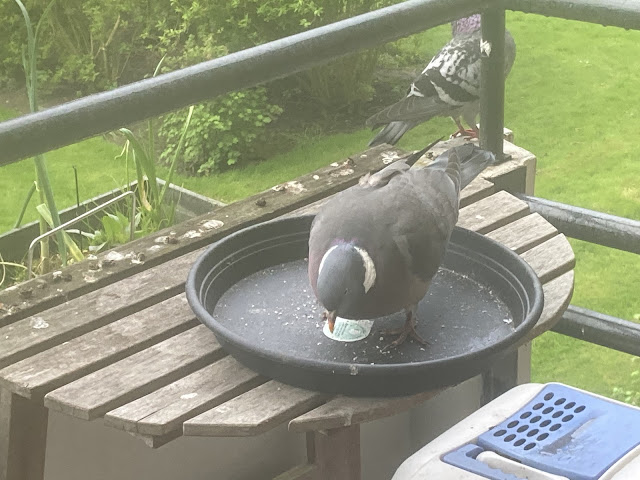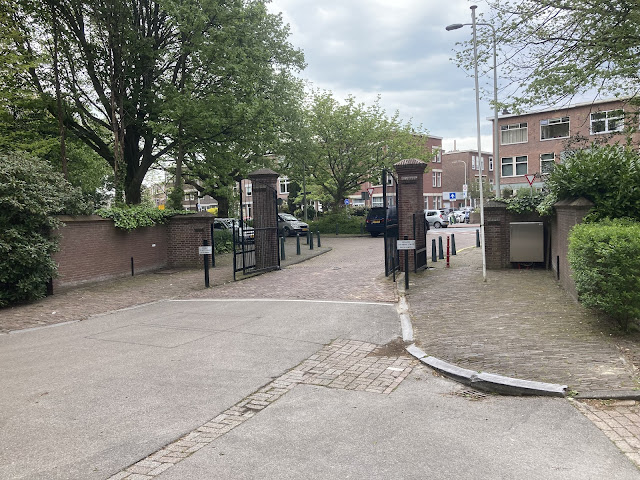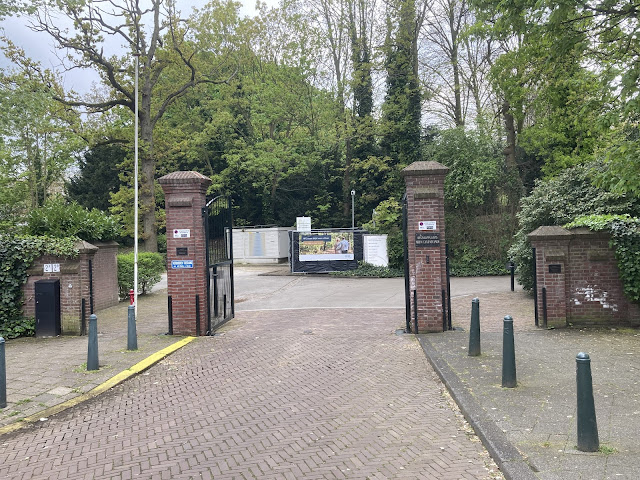piggy willy buikspreekpop van oranje na ss au zou een mooie toespraak gegeven hebben te emmen, ik ken die varkenskutkop niet verdragen, volledig voorbereid en geschreven door de hebzuchtige egoïstische ijdele vvd ggg ss animal farm varkens dienende ambt e naren, het is 1 public relations en marketing gebeuren om de verwoestende en vernielende status quo van ongelijkheid, egoïsme en gevangenschap van de mammon animal farm varkentjes en kippetjes in stand te houden .. en te zien en horen en voelen dat iedereen het laat gebeuren en eraan meewerkt .. en mark rutte, nog zo'n misbaksel buikspreekpop zwijntje van de bedrijfsdood en vvd ggg ss ambt e naren had een succesvolle missie naar turkije om zich van de functie van secreet generaal van de navo te verzekeren, akelig om dat allemaal te zien, horen en voelen..
morgen weer zondag, maandag weer yoga en sport, woensdag sport met suzanne, liever hoop dan wanhoop .. of met de moed der wanhoop .. oh, wat is het erg, oh, wat is het erg, dacht ik 100 keer, de eerste inname van verse mazteca paddestoelen, weliswaar kwam na 3 uur de bevrijdende schaterlach, maar hoe de mensenwereld eraan toe is, het is zo erg, het is zo afgrijse lijk, het is vrese lijk, ik wil in deze wereld niet leven, maar ben niet tot zelfmoord in staat en er brandt nog steeds iets, meer dan rancune, en zelfs een gevoel van geluk .. en diepste walging en weerzin .. ook al is het allemaal tevergeefs en in vain .. protest is futile, nothing seem to get through, everything is futile, nothing gets through these mammon pig heads
The southern wing of NATO "needs Turkey and its leadership," Rutte said, describing Ankara as a very influential actor in the region and a geopolitical power. Erdogan made no commitments on who Turkey would support or say what Ankara's position was. "No one should have any doubt that we will make our decision within the framework of strategic wisdom and equity," Erdogan said. He added that an ideal candidate for the post of NATO chief would "ensure solidarity within the alliance and order among the allies" and also "prioritize the preservation of NATO’s essential position in ensuring Euro-Atlantic security."
However, at the end of the news conference, Erdogan wished Rutte success and smiled at him. The exchange also drew a smile from Turkish Foreign Minister Hakan Fidan.
Shocker From Top Conservative Judge: Trump Likely To Skate Completely
“I’m profoundly disturbed about the apparent direction of the court,” J. Michael Luttig told me. “I now believe that it is unlikely Trump will ever be tried for the crimes he committed in attempting to overturn the 2020 election.”
I called Luttig, a former federal judge with extensive conservative credentials, to solicit his reaction to this week’s Supreme Court hearing over Donald Trump’s demand for absolute immunity from prosecution for any crimes related to his insurrection attempt. On Thursday, Luttig posted a thread critiquing the right-wing justices for their apparent openness to Trump’s arguments—but that thread was legalistic and formal, so I figured Luttig had a lot more to say.
And did he ever. Luttig lacerated the right-wing justices for harboring a “radical vision” of the American presidency, and pronounced himself “gravely” worried that Trump will never face accountability for alleged crimes committed in attempting to destroy U.S. democracy through extensive procedural corruption and the naked incitement of mob violence.
Luttig’s fear that Trump may very well skate centers on the lines of questioning from the court’s right-wing majority about Special Counsel Jack Smith’s ongoing prosecution of Trump. As many observers noted, those justices appeared largely uninterested in the question before them—whether Trump’s alleged crimes related to the insurrection constituted official presidential acts that are immune from prosecution after leaving office.
Instead, the justices dwelled on the supposed future consequences of prosecuting presidents for crimes, and seemed to want to place some limits on that eventuality. That suggests the justices will kick the case back to lower courts to determine whether some definition of official presidential acts must be protected (and whether Trump’s specific acts qualify).
Such a move would almost certainly push Trump’s trial until after the election, and if he wins, he can simply cancel prosecutions of himself. Luttig fears that outcome. But he also worries that even if Trump loses the election, there may well be five Supreme Court votes for siding with Trump’s demand for immunity. Both outcomes would functionally end his prosecution.
“I believe it is now likely either that Trump will get elected and instruct his attorney general to drop the charges, or that the Supreme Court will grant him immunity from prosecution,” Luttig told me.
To be sure, some observers think that in the end, five justices will not grant Trump that immunity. In this scenario, a conservative majority could remand the case to lower courts to define official presidential acts that cannot be prosecuted, even as some combination of five or more justices later rules that Trump’s specific actions are still subject to prosecution.
But Luttig fears that this may be overly optimistic.
Luttig pointed out that even Chief Justice John Roberts seemed to express some sympathy for the general idea that official presidential acts should be immune from prosecution. He also noted that Justice Brett Kavanaugh praised the pardon of Richard Nixon, and that Justice Neil Gorsuch said that if presidents can be prosecuted, they might pardon themselves before leaving office to protect themselves, which Gorsuch suggested might be legitimate.
Take all that together, Luttig said, and it’s not hard to see how five right-wing justices could let Trump off. Some could declare that Trump’s actions related to Jan. 6 (the pressure on his vice president to subvert the electoral count and on the Justice Department to create a fake pretext for that) constitute official acts immune from prosecution. Others might hold that the statutes Trump allegedly violated don’t offer a clear statement that they apply to presidents, Luttig said.
Either way, Trump has already gotten much of what he wants with the all-but-certain delay. And the lines of questioning from the right-wing justices are already deeply alarming, Luttig argued. Justice Samuel Alito, for instance, declared that if presidents must fear prosecution after leaving office, they might prove more prone to resisting the transfer of power, destabilizing the country.
That’s preposterous, as The New Republic’s Michael Tomasky noted, since there’s never been a bar on post-presidential prosecution throughout U.S. history, yet the only president to aggressively resist that transfer is Donald Trump himself. What’s more, as Dahlia Lithwick and Mark Joseph Stern point out at Slate, the notion also seems to suggest, absurdly, that giving presidents free rein to commit crimes in office, including attempting to destroy democracy at its very foundations, is essential to maintaining democratic stability.
One might add that when the justices ruled that Trump’s insurrection does not disqualify him from the ballot, they told us that this, too, was necessary to avoid national destabilization. Mysteriously enough, a key ingredient for achieving political stability always seems to involve not holding Trump accountable.
“The conservative justices’ argument for immunity assumes that Jack Smith’s prosecution of Trump is politically corrupt and seeks a rule that would prevent future presidents from corruptly prosecuting their predecessors,” Luttig said.
“But such a rule would license all future presidents to commit crimes against the United States while in office with impunity,” Luttig concluded. “Which is exactly what Trump is arguing he’s entitled to do.”
A lower Manhattan courtroom just dealt a fatal blow to the Trump mystique
On opening night of the Republican National Convention in 2016, Donald Trump came out onstage like a pro wrestler, amid clouds from a smoke machine and dramatic shadows.
It was the kind of image he likes to project of himself: grandiose and imposing, like the floating head of the Great and Powerful Oz ordering Dorothy to bring him the broomstick of the Wicked Witch.
But eight years later, the real Trump has been revealed before the world in a courtroom in lower Manhattan. Whether he was sitting in the courtroom or standing outside of it amid bad fluorescent lighting, he looked small, diminished and the very opposite of presidential.
And just as the Wizard of Oz tried desperately to distract Dorothy and her friends when he was revealed, Trump and his lawyers are trying hard to keep the public from looking at the man behind the curtain.
“We will call him ‘President Trump’ out of respect for the office that he held from 2017 to 2021,” his lawyer Todd Blanche said during opening statements this week. “And as everybody knows, it’s the office he’s running for right now."
Trump’s lawyers can use whatever title they want, but there is nothing presidential about what’s unfolding in that courtroom. Make no mistake, Trump’s current circumstances define him. The fact that he has spent every day court has been in session at the courthouse is the physical representation that Trump is not special. He is not above reproach and not above the law. His fate, like the fate of every other defendant in a jury trial, is in the hands of his fellow citizens.
The case, too, has diminished Trump. Focusing on his actions during the 2016 election, prosecutors have presented him as a small man, desperate to protect his reputation, colluding with the editors of a tabloid newspaper to spread smears about his opponents and pay off anyone who might share the truth about him.
The ex-president’s longtime friend, former National Enquirer publisher David Pecker, has already proved to be a star witness in this trial. In court testimony, Pecker detailed the steps he took to fabricate actual fake news against Trump’s political opponents and “catch and kill” damaging allegations against Trump during the 2016 election.
The details have truly been stunning. I lived and worked through the 2016 presidential election, and even I learned new things when I read Pecker’s testimony.
I had to read it because — to the detriment of the American voters, there are no cameras or microphones to allow them to see and hear the testimony from inside the courtroom. That’s left the public relying on the exceptional journalists sitting inside to paint a picture of the ongoing revelations. That picture is far more damning than even the allegations that Trump cheated on his wife by having a one-night stand with an adult-film actor. (Trump has denied the affair and pleaded not guilty in the case.)
During opening statements, the Manhattan district attorney’s office argued that the case was actually about “election fraud, pure and simple.” The prosecution then described the case to the jury as an orchestrated criminal scheme to corrupt the 2016 presidential election by paying people to stay silent about stories that might damage one of the two major candidates’ reputations.
It’s not the only case revolving around Trump’s disgraceful approach to democratic elections, either.
In the federal election interference case against Trump, special counsel Jack Smith similarly accused Trump of defrauding the country he once led. And in the Fulton County, Georgia, election interference case against Trump and his co-defendants, District Attorney Fani Willis described the sprawling RICO case as a plot to steal the 2020 election. (Trump has pleaded not guilty in both cases.)
The allegations in these cases spell out the brazen ways Trump has plotted to secure and hold on to power. They are not a coincidence, they are a pattern, and one that he will keep attempting in his third run for the White House this year.
Trump may try, just as the Wizard of Oz desperately pushed buttons and pulled levers, to maintain his failing facade before finally admitting that he was nothing more than a humbug.
For more thought-provoking insights from Symone Sanders-Townsend, Alicia Menendez, and Michael Steele, watch “The Weekend” every Saturday and Sunday at 8 a.m. ET on MSNBC.
This article was originally published on MSNBC.com
Lunar Delivery
NASA is still hoping to carefully lower astronauts to the lunar surface from a SpaceX Starship, marking humanity's triumphant return after over half a century.
At least, that's according to the plan as it currently stands. As part of its Artemis 3 mission, NASA is looking to launch a crew of four to the Moon as early as 2026 onboard its Orion capsule and then make its descent to the surface in a Starship.
Around five years later, NASA wants to leverage the help of both SpaceX and Jeff Bezos' space company Blue Origin to ferry cargo landers to the lunar surface.
"It’s essential that NASA has the capability to land not just astronauts, but large pieces of equipment, such as pressurized rovers, on the Moon for maximum return on science and exploration activities," said NASA Human Landing System program manager Lisa Watson-Morgan in a statement. "Beginning this work now allows SpaceX and Blue Origin to leverage their respective human lander designs to provide cargo variants that NASA will need in the future."
In other words, instead of starting from scratch, the idea is to make changes to existing lunar landers, including "adjustments for payload interfaces and deployment mechanisms," according to NASA. The new variants will also have no human life support systems, giving the companies far more room to play with.
Of course, NASA and its partners still have a lot to prove. As of now, SpaceX has yet to successfully launch and land its Starship rocket on Earth, nevermind the Moon. And Blue Origin hasn't even launched anything to orbit yet.















































































































Geen opmerkingen:
Een reactie posten